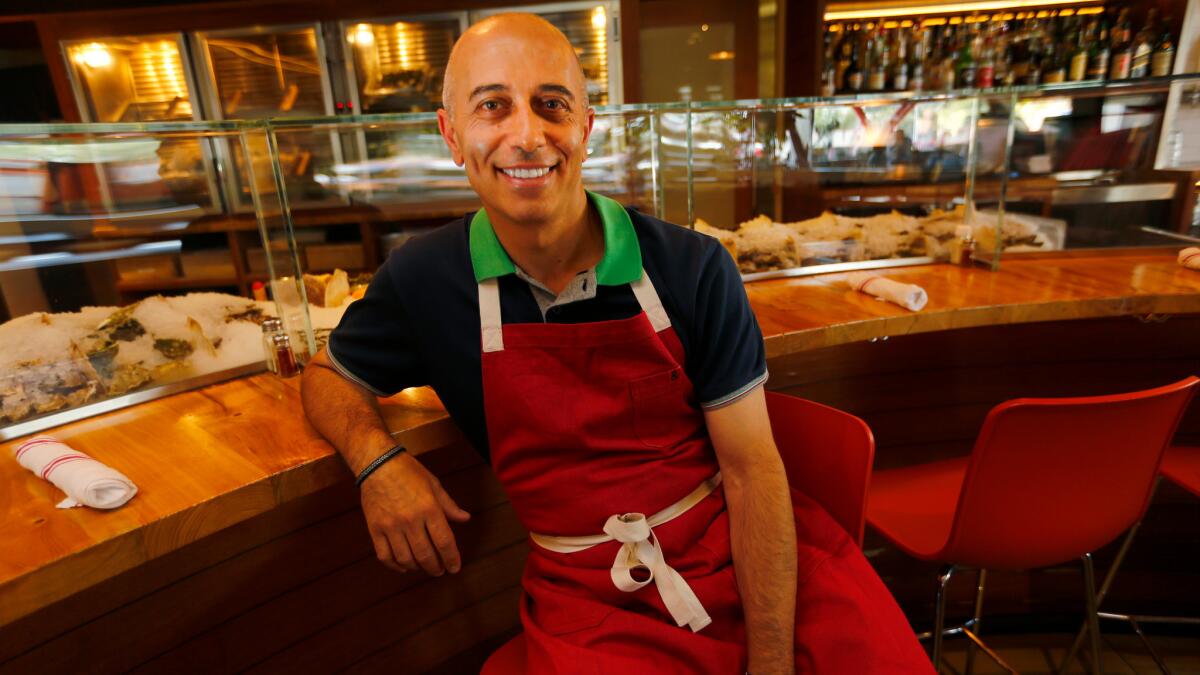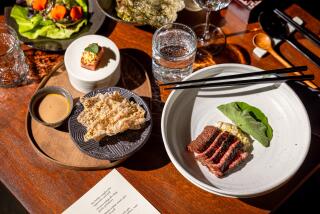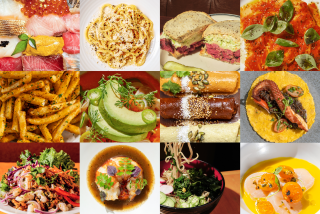Friendly yet professional: L.A.’s restaurants work hard to ensure service matches the city’s vibe

The conversation about restaurants in Los Angeles is most often about food, and rightfully so, but the experience of dining in restaurants is also about something else. The lighting, the music, the thrill of being remembered on a return visit – this is the domain of the front of house, a brigade made up of hosts, bussers, bartenders, servers and managers. It’s called hospitality, and just like the food itself — and the expectation of the diners — it continues to be reinvented.
“In the last five years L.A. has seen the biggest change in restaurants,” says Donato Poto, who along with chef Michael Cimarusti co-owns Providence, the elegant, white-tablecloth establishment that maintains the No. 1 spot on Jonathan Gold’s 101 Best Restaurants list. Three years ago the duo opened a second restaurant, Connie and Ted’s, their contemporary riff on a West Hollywood seafood shack where instead of tableside salt-roasted prawns you can get a decidedly casual bowl of “Wicked Good Chowda’.”
Connie and Ted’s laid-back aesthetic – exposed wooden beams and plastic tomato-colored chairs – belie the rigor behind Poto’s front-of-house training, a two-week process that includes daily quizzes and shifts at every station. The restaurant is proof of L.A.’s evolving notion of hospitality, that casual environs can dish out serious service.
Ask Angelenos about restaurant hospitality and Poto’s name invariably comes up. Whether dressed in an Armani suit at Providence (“some people spend money on drugs, I spend it on suits”) or wrapped in his signature red Hedley & Bennett apron at Connie and Ted’s, he is the consummate front of house personality. Born on the Amalfi Coast, he has an effortless tableside manner that comes from decades of experience, first at school in his hometown of Salerno, where he studied hospitality, and later at apprenticeships in Europe, including one job that had him deboning game birds blindfolded to prepare him for tableside service. In 1986, when he was 22, he landed in L.A. and found a home at the now-shuttered Primi in Santa Monica, where he credits legendary restaurateur Piero Selvaggio (whose restaurant Valentino celebrates 44 years this December) as his mentor. Stints as the general manager of Water Grill (where he met Cimarusti) and Bastide followed, before he and Cimarusti opened Providence in 2005.
Poto recalls the exact moment, eight years ago, when he saw service in L.A. make a radical shift. It was midnight at Animal, Jon Shook and Vinny Dotolo’s first restaurant on Fairfax Avenue, when Poto and his wife sat down for dinner. The server approached the table, and after a friendly “Hey folks” took a seat next to Poto’s wife to explain the menu. “I was speechless,” he recalls. “I didn’t know if I should laugh or tell the guy to get up.”
Helen Johannesen was less amused when she witnessed a server sit down with the guests on her first shift as general manager at Animal. Coming from Craft restaurant group where she was the maître d, she immediately ended the practice and began refining service to feel polished yet relaxed, a style she’s replicated as director of operations for Shook and Dotolo’s burgeoning empire: Son of a Gun, Trois Mec, Petit Trois, Trois Familia and Jon & Vinny’s.
“It was the Wild West,” Johannesen, now 33, remembers of the early days. “We had to adapt our service to be even better because people walking into Animal feel intrigued, but some people feel uncomfortable. It’s pig ears, veal brains, we’re playing hip-hop, it’s a little louder. In New York this was happening, but for people in L.A. it was a different experience.”
In the three years before Animal opened its doors, Yelp exploded, food blogs flourished and “Top Chef” debuted on Bravo. By 2008, diners arrived at the table armed with culinary knowledge and ready for an adventure.
“I didn’t know if I’d ever see the day in Los Angeles,” says David Rosoff of the new wave of restaurant-goers. “People are finally willing to go along for the ride. Substitutions and deletions are going away.”
Rosoff, a native Angeleno with three decades of fine-dining experience, credits Animal with liberating L.A. restaurant professionals from the white glove of old-fashioned service. Earlier this year he abandoned ceramic dinnerware in favor of bamboo plates and cardboard boxes when he opened Moruno, a Spanish restaurant and takeout window with locations at the Original Farmers Market and Grand Central Market, two open-air food halls where basic comforts like walls and air conditioning are noticeably absent.
The 49-year-old’s résumé includes managing restaurants such as Michael’s, Opaline (where he was part-owner), Campanile and Mozza (where he ran the dining room for the restaurant’s first eight years). Talking outside Moruno’s Grand Central Market location in the midst of a recent triple-digit heat wave, Rosoff motions to the open-air footprint and describes how his own hospitality style has evolved.
“It’s 102 degrees right now and there’s no AC here,” Rosoff says. “So if someone doesn’t understand why the air conditioning isn’t on, I can apologize and explain why that’s the case, but the way I was raised I would probably apologize profusely, tell them it was my fault, buy them their meal and invite them back for another one.”
Like Johannesen at Animal and Poto at Connie and Ted’s, Rosoff hasn’t abandoned tradition, but instead adapted the tools of the trade – attention to detail and an emphasis on consistency — to suit a customer base that would rather wear a T-shirt than a tie to dinner.
For Maxfield Schnee, a Rosoff protégé and general manager of Orsa & Winston, Josef Centeno’s tasting menu concept in downtown L.A., great service isn’t about fancy appointments, but about anticipating the guest’s needs before they arrive and the ability to adapt to their preferences once they sit down.
Of the nine walnut-topped tables at Orsa & Winston, one might be occupied by a couple decked out in a ball gown and a three-piece suit, while next to them sits a young man in board shorts with sand in his hair. If both the ball gown and the board shorts are black, both will receive black napkins to ensure their laps don’t end up spotted with white lint. Fine dining isn’t dead in Los Angeles, he says, “it’s just that we’ve redefined it so many times. We can’t help but do things our way, and our way is exciting.”
Poto is more cautiously optimistic. “The restaurant business has evolved much more in food, creativity and appreciation,” he says of Los Angeles. “Service is not moving at the same speed as the food.”
Poto considered opening a small hospitality school but instead uses Providence and Connie and Ted’s as his training ground. Headhunters call him three times a week in search of capable managers who have trained under his supervision, but as the restaurant industry has exploded, the number of qualified candidates remains stagnant. “Before you had a choice of 10 managers and 10 restaurants,” he says. “Now you have 10 managers and 50 restaurants.”
Over the next two years Los Angeles will see even more restaurants opening, including new concepts from out-of-town chefs accustomed to working with a high level of service in the dining room. James Beard Award-winners like Jessica Largey, formerly of the three-Michelin Manresa in Los Gatos, Dave Beran of Next in Chicago, April Bloomfield of New York’s Spotted Pig and Charles Phan of San Francisco’s Slanted Door all plan to open restaurants in Los Angeles within the next two years, but the question remains whether Los Angeles’ hospitality industry can supply the front-of-house staff to match the back-of-house prowess.
As for what service will look like in their L.A. restaurants, Schnee is less sure, but it’s “certainly not going to be a 5,000-page, leather-bound tome of wine set down on an over-starched white linen with Rachmaninoff’s Third playing in the background.”
Schnee views the coming wave of talent as a call to arms for his hospitality colleagues. “We’re going to have to rise to the occasion,” he says, “because people like [Largey and Beran] aren’t going to settle for anything less than the best.”
More to Read
Eat your way across L.A.
Get our weekly Tasting Notes newsletter for reviews, news and more.
You may occasionally receive promotional content from the Los Angeles Times.






